22 must-read books for coaches, athletic directors
Books are great resources to teach coaches and athletic administrators about philosophy, leadership and team building. We regularly speak with athletic administrators who assign books to their coaching staffs, or coaches who require that their captains read about becoming a role model. But what books are best?
Coach & Athletic Director (in conjunction with our sister publication, Winning Hoops) polled readers, asking their recommendations for books that all coaches, athletic administrators and other sports professionals must read to become a true leader for their programs. Here are the 22 most popular selections.
3D Coach (Jeff Duke)
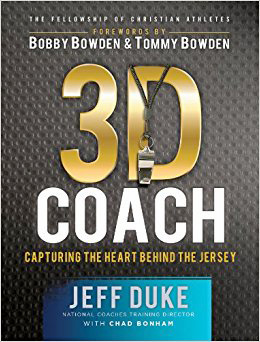
In 3D Coach, Jeff Duke (of the 3D Institute) shares his journey through the three dimensions of coaching, and how they have impacted his life and those around him. He also shares the personal stories of coaches from all levels who have implemented the 3D concept into their own programs, and the success that has followed.
Research shows that only 15 percent of coaches are intentional about coaching beyond the skills and strategies of the game (first dimension). A 3D coach understands and harnesses the power of the coaching platform to coach the mind (second dimension) and transform the heart (third dimension), and they can be the catalysts for internal transformation that guides both the coach and the athlete on a spiritual journey to finding purpose in this performance-based culture of sport.
The 7 Habits of Highly Effective People (Stephen R. Covey)
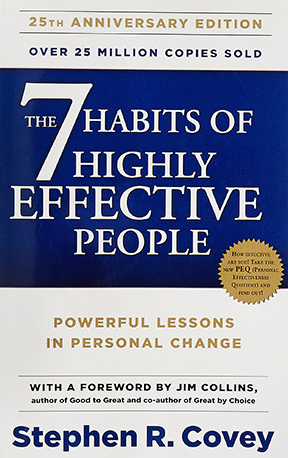 “Your life doesn’t just happen,” Covey writes. “Whether you know it or not, it is carefully designed by you. The choices, after all, are yours. You choose happiness, sadness, decisiveness, ambivalence and success. You choose failure, courage and fear. Just remember that every moment, every situation, provides a new choice. And in doing so, it gives you a perfect opportunity to do things differently to produce more positive results.”
“Your life doesn’t just happen,” Covey writes. “Whether you know it or not, it is carefully designed by you. The choices, after all, are yours. You choose happiness, sadness, decisiveness, ambivalence and success. You choose failure, courage and fear. Just remember that every moment, every situation, provides a new choice. And in doing so, it gives you a perfect opportunity to do things differently to produce more positive results.”
Covey sold more than 20 million copies of 7 Habits, which has been called one of the most inspiring books ever written. Covey was named among TIME Magazine’s 25 Most Influential Americans, and he holds the Jon M. Huntsman Presidential Chair in Leadership at the Huntsman School of Business at Utah State University.
Above the Line (Urban Meyer)
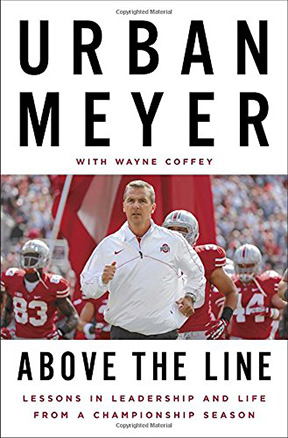 A student of psychology long before he became a coach, Urban Meyer believes that trust is the bedrock of great achievements and healthy relationships, and explains how to build it, step by step — whether in a team, a family or a Fortune 500 company. With trust in place, a deep bond unites us in common purpose, and cultivates what he calls “Above the Line” behavior — a learned, empowered response to the challenges we face every day.
A student of psychology long before he became a coach, Urban Meyer believes that trust is the bedrock of great achievements and healthy relationships, and explains how to build it, step by step — whether in a team, a family or a Fortune 500 company. With trust in place, a deep bond unites us in common purpose, and cultivates what he calls “Above the Line” behavior — a learned, empowered response to the challenges we face every day.
“We teach our players, in response to any situation they face, to press pause and ask: What does this situation require of me?,” Meyer writes. “Pressing pause gives you time to think. It gets you off autopilot and helps you gain clarity about the outcome you are pursuing, the situation you are experiencing, and the Above the Line action you need to take to achieve the outcome.”
Chop Wood Carry Water (Joshua Medcalf)
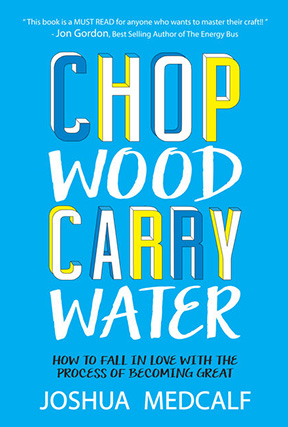 Guided by “Akira-sensei,” John comes to realize the greatest adversity on his journey will be the challenge of defeating the man in the mirror. This powerful story of one boy’s journey to achieve his life-long goal of becoming a samurai warrior, brings the “Train to be Clutch” curriculum to life in a powerful and memorable way.
Guided by “Akira-sensei,” John comes to realize the greatest adversity on his journey will be the challenge of defeating the man in the mirror. This powerful story of one boy’s journey to achieve his life-long goal of becoming a samurai warrior, brings the “Train to be Clutch” curriculum to life in a powerful and memorable way.
“Everyone wants to be great, until it’s time to do what greatness requires,” Medcalf writes. Medcalf authored another popular book titled, Burn Your Goals: The Counter Cultural Approach to Achieving Your Greatest Potential.
Eleven Rings (Phil Jackson)
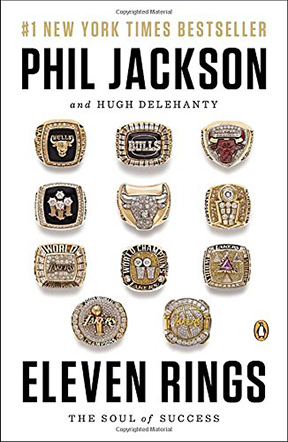
One of the most decorated coaches in sports history, we can all learn a lot from the “Zen master.” In Eleven Rings, Phil Jackson explores everything from humanistic psychology and Native American philosophy to Zen meditation. In the process, he developed a new approach to leadership based on freedom, authenticity, and selfless teamwork that turned the hypercompetitive world of professional sports on its head.
“The most we can hope for is to create the best possible conditions for success, then let go of the outcome,” Jackson writes. “The ride is a lot more fun that way.”
The Energy Bus (Jon Gordon)
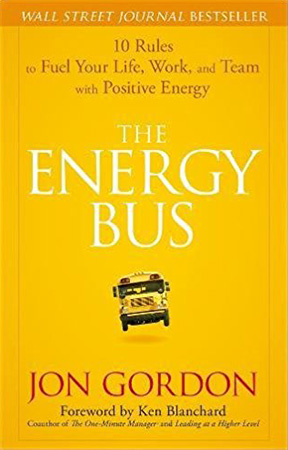 Jon Gordon takes readers on an enlightening and inspiring ride that reveals 10 secrets for approaching life and work with the kind of positive, forward thinking that leads to true accomplishment — at work and at home. For coaches and team leaders, The Energy Bus provides a powerful roadmap to overcome common life and work obstacles and bring out the best in yourself and your team.
Jon Gordon takes readers on an enlightening and inspiring ride that reveals 10 secrets for approaching life and work with the kind of positive, forward thinking that leads to true accomplishment — at work and at home. For coaches and team leaders, The Energy Bus provides a powerful roadmap to overcome common life and work obstacles and bring out the best in yourself and your team.
“I have never enjoyed reading a book more than The Energy Bus by Jon Gordon,” said Clemson head football coach Dabo Swinney. “It should be required reading in this country. In a time and world where we deal with so many negative things and people, Jon beautifully articulates the power of positive energy and attitude. This book will change your life and teach you how to be the driver of your bus.”
Finding the Winning Edge (Bill Walsh)
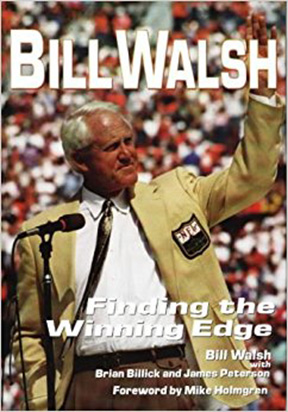 In Finding the Winning Edge, Bill Walsh — Hall of Fame NFL coach and three-time Super Bowl champion — illustrates and outlines the basic organizational, coaching and system philosophies that he has used throughout his career. He discusses the methods behind fixing a troubled organization, including his program for hiring and developing a staff; evaluating and acquiring key players; building a game plan; and overcoming the mental barriers that frequently plague talented teams.
In Finding the Winning Edge, Bill Walsh — Hall of Fame NFL coach and three-time Super Bowl champion — illustrates and outlines the basic organizational, coaching and system philosophies that he has used throughout his career. He discusses the methods behind fixing a troubled organization, including his program for hiring and developing a staff; evaluating and acquiring key players; building a game plan; and overcoming the mental barriers that frequently plague talented teams.
“Do everything possible not to personalize your team’s losses,” Walsh writes. “Exhibit an inner toughness emanating from three of the most effective survival tools — composure, patience and common sense.”
Good to Great (Jim Collins)
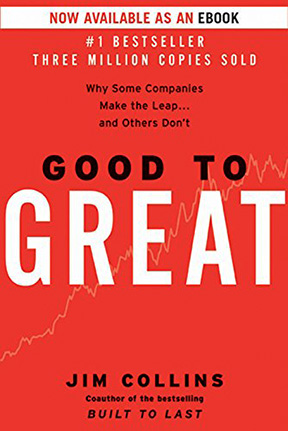 Another book that offers lessons in business management that can be applied to your sports program. Jim Collins, who also co-authored Built to Last, describes how businesses transition from being good companies to great companies, and how most companies fail to make the transition.
Another book that offers lessons in business management that can be applied to your sports program. Jim Collins, who also co-authored Built to Last, describes how businesses transition from being good companies to great companies, and how most companies fail to make the transition.
In Good to Great, Collins offers seven characteristics of companies that made the leap to greatness. Among them are a culture of discipline and a knack for finding the right people and putting them in positions to succeed. “Greatness is not a function of circumstance,” Collins writes. “Greatness, it turns out, is largely a matter of conscious choice, and discipline.”
InSideOut Coaching (Joe Ehrmann)
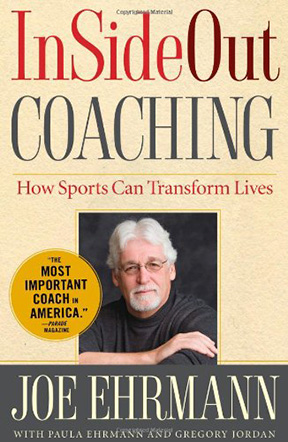 Joe Ehrmann, who Parade called “the most important coach in America,” describes his coaching philosophy and explains how sports can transform lives at every level of play, from the earliest years to professional sports.
Joe Ehrmann, who Parade called “the most important coach in America,” describes his coaching philosophy and explains how sports can transform lives at every level of play, from the earliest years to professional sports.
Too many people are transactional coaches — they focus solely on winning and meeting their personal needs, Ehrmann writes. Some coaches, however, use their platform. They teach the Xs and Os, but also teach the Ys of life. They help young people grow into responsible adults; and they leave a lasting legacy. These are the transformational coaches. These coaches change lives, and they also change society by helping to develop healthy men and women.
Lead… for God’s Sake! (Todd G. Gongwer)
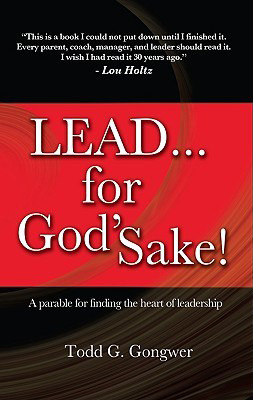 The lives of an intensely-driven basketball coach, an ultra-successful CEO and an unassuming janitor all intersect in this captivating parable about leadership, relationships and the pursuit of success. Whether you’re leading a business, a team or your own family, Lead… for God’s Sake! helps coaches and ADs become the leaders they were meant to be.
The lives of an intensely-driven basketball coach, an ultra-successful CEO and an unassuming janitor all intersect in this captivating parable about leadership, relationships and the pursuit of success. Whether you’re leading a business, a team or your own family, Lead… for God’s Sake! helps coaches and ADs become the leaders they were meant to be.
“The best leaders’ legacies produce what Jesus called ‘good fruit,’ lived out through others way after they themselves have gone by the wayside,” Gongwer writes. “But everything starts with selfless thinking. Will I lead for my reasons, or for the benefit of others?”
Leading with the Heart (Mike Krzyzewski)
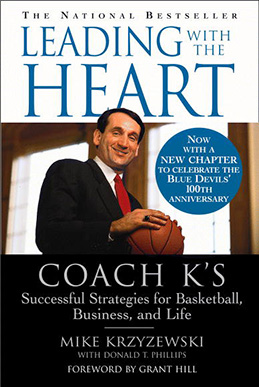 Duke University men’s basketball coach Mike Krzyzewski has won five national championships, and his Blue Devils consistently rank among the best teams in the nation. Who wouldn’t want to learn from Coach K?
Duke University men’s basketball coach Mike Krzyzewski has won five national championships, and his Blue Devils consistently rank among the best teams in the nation. Who wouldn’t want to learn from Coach K?
In Leading with the Heart, Krzyzewski talks about leadership — how you earn it, how you practice it and how you use it to move your organization to the top. From the importance of trust, communication, and pride, to the commitment a leader must make to his team, Coach K shares a variety of concepts, ideas and philosophies that can create a winning environment in your program.
The Politics of Coaching (Carl J. Pierson)
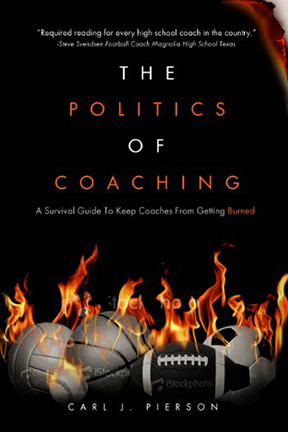 The pressures of coaching can push even the best people out of the profession. Carl Pierson uses his two decades of coaching and political science background to offer real world examples and practical advice on eternally troubling topics like picking teams, playing time, powerful parents, booster clubs and other issues that today’s coaches have to contend with. The Politics of Coaching is nothing short of a playbook to help coaches navigate their way through the perilous, stressful world that has become coaching.
The pressures of coaching can push even the best people out of the profession. Carl Pierson uses his two decades of coaching and political science background to offer real world examples and practical advice on eternally troubling topics like picking teams, playing time, powerful parents, booster clubs and other issues that today’s coaches have to contend with. The Politics of Coaching is nothing short of a playbook to help coaches navigate their way through the perilous, stressful world that has become coaching.
“When players know that their coach cares about them and has their best interest at heart,” Pierson writes, “coaches can be demanding and players will always respond.”
Relentless (Tim S. Grover)
 Fore more than two decades, legendary trainer Tim Grover has taken the greats — Michael Jordan, Kobe Bryant, Dwayne Wade, and dozens more — and made them greater. Now, for the first time ever, he reveals what it takes to get those results, showing you how to be relentless and achieve whatever you desire.
Fore more than two decades, legendary trainer Tim Grover has taken the greats — Michael Jordan, Kobe Bryant, Dwayne Wade, and dozens more — and made them greater. Now, for the first time ever, he reveals what it takes to get those results, showing you how to be relentless and achieve whatever you desire.
“Tim Grover is the master of mental toughness,” Kobe Bryant writes about the book. “This book is the blueprint for discovering what you are capable of achieving, getting results you never imagined, reaching the highest level of success, and then going even higher.”
Sacred Hoops (Phil Jackson)
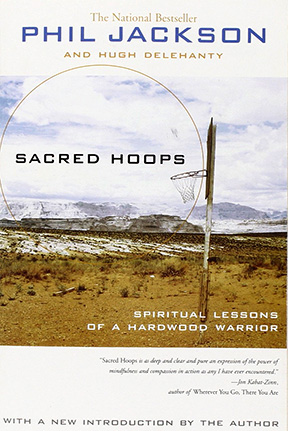 The legendary NBA coach takes an inside look at the wisdom of teamwork. He also discusses how he convinced some of the game’s top players — Michael Jordan, Kobe Bryant, Scottie Pippen, Dennis Rodman — to act with a clear mind. Not thinking, just doing; to respect the enemy and be aggressive without anger or violence; to live in the moment and stay calmly focused in the midst of chaos; and to put the “me” in service of the “we.”
The legendary NBA coach takes an inside look at the wisdom of teamwork. He also discusses how he convinced some of the game’s top players — Michael Jordan, Kobe Bryant, Scottie Pippen, Dennis Rodman — to act with a clear mind. Not thinking, just doing; to respect the enemy and be aggressive without anger or violence; to live in the moment and stay calmly focused in the midst of chaos; and to put the “me” in service of the “we.”
“In basketball — as in life — true joy comes from being fully present in each and every moment,” Jackson writes, “not just when things are going your way.”
The Gold Standard (Mike Krzyzewski)
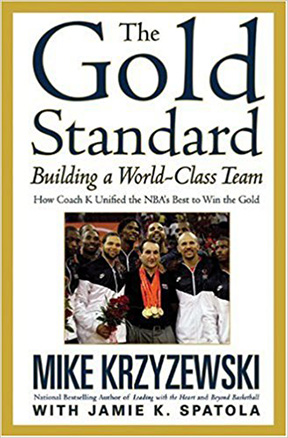 Coach K’s second book to make our must-read list. In The Gold Standard: Building a World Class Team, the Duke coach writes about his experiences coaching the U.S. Olympic Basketball squad. He worked with some of the game’s biggest egos and and navigated personal rivalries to piece together a team that could beat the best competition in the world. Half of the book focuses on basketball, while the other half examines his management techniques for leading the team during the Olympics.
Coach K’s second book to make our must-read list. In The Gold Standard: Building a World Class Team, the Duke coach writes about his experiences coaching the U.S. Olympic Basketball squad. He worked with some of the game’s biggest egos and and navigated personal rivalries to piece together a team that could beat the best competition in the world. Half of the book focuses on basketball, while the other half examines his management techniques for leading the team during the Olympics.
“I always tried to explain to the players their roles on the team, roles that were always evolving,” Krzyzewski writes. “When you give time to a person and explain their ever-evolving role, it makes them feel good. It is a reminder to them that their role is important enough to warrant explanation.”
The Talent Code (Daniel Coyle)
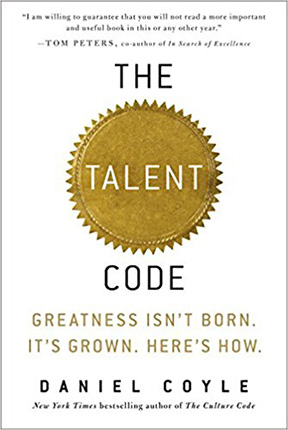 Drawing on cutting-edge neurology and firsthand research gathered on journeys to nine of the world’s talent hotbeds —from the baseball fields of the Caribbean to a classical-music academy in upstate New York — Coyle identifies the three key elements that allow you to develop your gifts and optimize your performance in sports, art, music, math or anything else. He even examines specific practices techniques that can allow coaches to improve skill must faster than conventional practice.
Drawing on cutting-edge neurology and firsthand research gathered on journeys to nine of the world’s talent hotbeds —from the baseball fields of the Caribbean to a classical-music academy in upstate New York — Coyle identifies the three key elements that allow you to develop your gifts and optimize your performance in sports, art, music, math or anything else. He even examines specific practices techniques that can allow coaches to improve skill must faster than conventional practice.
“Although talent feels and looks predestined, in fact we have a good deal of control over what skills we develop, and we have more potential than we might ever presume to guess,” Coyle writes.
The Winner Within (Pat Riley)
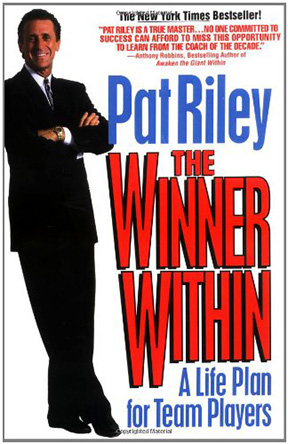 Pat Riley’s head coaching résumé includes five NBA championships and three Coach of the Year honors. As an executive, he’s been a part of three NBA championships and in 2011 was named the league’s Executive of the Year. The Winner Within is Riley’s game plan for team players in all of life — not just on the court but in business, at home and in personal achievement. This book reveals his winning strategies that inspire change, motivate teamwork, and unleash the winner within us all.
Pat Riley’s head coaching résumé includes five NBA championships and three Coach of the Year honors. As an executive, he’s been a part of three NBA championships and in 2011 was named the league’s Executive of the Year. The Winner Within is Riley’s game plan for team players in all of life — not just on the court but in business, at home and in personal achievement. This book reveals his winning strategies that inspire change, motivate teamwork, and unleash the winner within us all.
“If you’re going to be a championship team, you have to think championship thoughts. ‘It’s OK to lose’ will never be one of them,” Riley writes. “If you hear yourself, or your teammates, starting sentences with ‘If only’ or ‘I could’ve’ or ‘We should’ve,’ you’ve heard thoughts that are going in the wrong direction.”
Toughness (Jay Bilas)
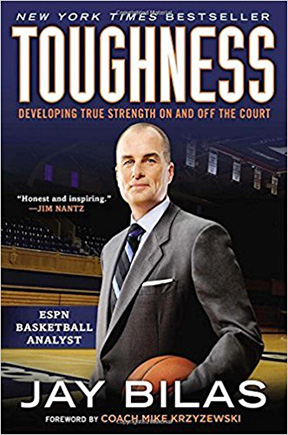 A four-year starter at Duke under coach Mike Krzyzewski, Bilas learned the true meaning of toughness from coaches and teammates. In Toughness, he discusses this misunderstood attribute and how it contributes to winning in sports and in life. Featuring stories and personal philosophies on toughness from top players and coaches. They include Coach K, Bob Knight, Grant Hill, Mia Hamm, Jon Gruden, Tom Izzo, Bill Self, Curtis Strange, and many others — Bilas redefines what it takes to succeed.
A four-year starter at Duke under coach Mike Krzyzewski, Bilas learned the true meaning of toughness from coaches and teammates. In Toughness, he discusses this misunderstood attribute and how it contributes to winning in sports and in life. Featuring stories and personal philosophies on toughness from top players and coaches. They include Coach K, Bob Knight, Grant Hill, Mia Hamm, Jon Gruden, Tom Izzo, Bill Self, Curtis Strange, and many others — Bilas redefines what it takes to succeed.
“Life isn’t easy, but you never quit,” Bilas writes “Never. I may not have been the best, but I can always give my best. That’s how you demonstrate toughness.”
What Drives Winning (Brett Ledbetter)
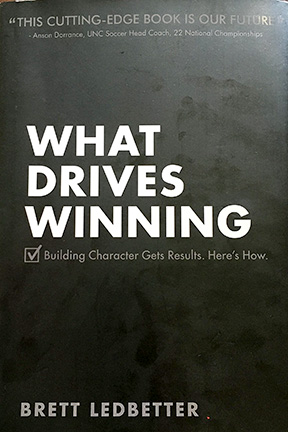 What Drives Winning drills down into the details to reveal what it takes to be successful in sports. Ledbetter shares real-life examples and time-tested advice from some of the winningest coaches in sports history, as well as a number of easy-to-follow exercises that can help you better understand what drives winning for yourself and your team.
What Drives Winning drills down into the details to reveal what it takes to be successful in sports. Ledbetter shares real-life examples and time-tested advice from some of the winningest coaches in sports history, as well as a number of easy-to-follow exercises that can help you better understand what drives winning for yourself and your team.
“What Drives Winning is long overdue,” said performance psychologist Jim Loehr. “Brett masterfully articulates how character building is the ultimate prize in the pursuit of athletic achievement. The book is immensely practical and filled with time tested wisdom.”
Win Forever (Pete Carroll)
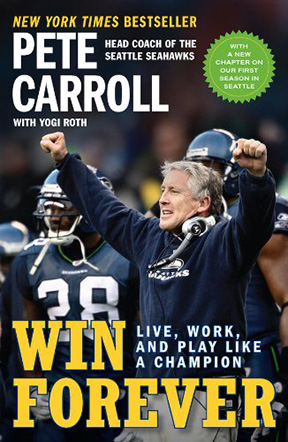 Carroll developed his coaching style by trial and error over his career. He learned that you get better results by teaching instead of screaming. You do it by helping players grow as people, not just on the field. He learned that an upbeat, energetic atmosphere in the locker room can coexist with an unstoppable competitive drive.
Carroll developed his coaching style by trial and error over his career. He learned that you get better results by teaching instead of screaming. You do it by helping players grow as people, not just on the field. He learned that an upbeat, energetic atmosphere in the locker room can coexist with an unstoppable competitive drive.
In his book, Carroll shows us how his philosophy really works, both in Division I football and in the NFL. He reveals how his recruiting strategies, training routines, and game-day rituals preserve a team’s culture year after year.
“I’ve learned that possibly the greatest detractor from high performance is fear,” Carroll writes. “If you can eliminate that fear — not through arrogance or just wishing difficulties away, but through hard work and preparation — you will put yourself in an incredibly powerful position to take on the challenges you face.”
Wooden (John Wooden)
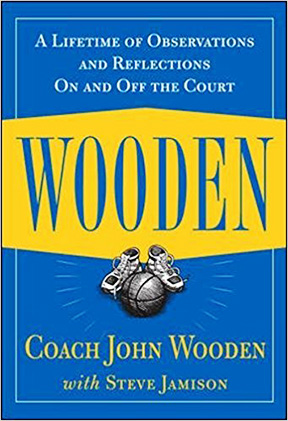 One of the most powerful names in sports, John Wooden was a master coach and motivator. In Wooden: A Lifetime of Observations and Reflections On and Off the Court, the legend shares his personal philosophy on family, achievement, success and excellence. He also offers lessons and wisdom learned throughout his career at UCLA, and life as a dedicated husband, father and teacher. The book is consistently named among the most important published works for coaches at all levels of sport.
One of the most powerful names in sports, John Wooden was a master coach and motivator. In Wooden: A Lifetime of Observations and Reflections On and Off the Court, the legend shares his personal philosophy on family, achievement, success and excellence. He also offers lessons and wisdom learned throughout his career at UCLA, and life as a dedicated husband, father and teacher. The book is consistently named among the most important published works for coaches at all levels of sport.
“Never make excuses,” Wooden writes. “Your friends don’t need them and your foes won’t believe them.”
You Win the Locker Room First (Jon Gordon/Mike Smith)
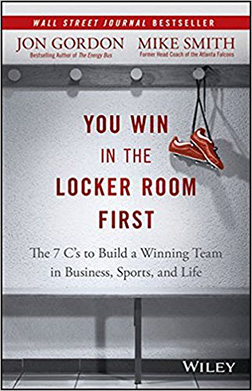 This draws on the extraordinary experiences of Super Bowl champion coach Mike Smith and Jon Gordon, a consultant to numerous college and professional teams. The two explore seven powerful principles that any business, school, organization or sports team can adopt to revitalize their organization. They also outline a strategy for building a thriving organization and provide a practical framework that give leaders the tools they need to create a great culture and lead with the right mindset.
This draws on the extraordinary experiences of Super Bowl champion coach Mike Smith and Jon Gordon, a consultant to numerous college and professional teams. The two explore seven powerful principles that any business, school, organization or sports team can adopt to revitalize their organization. They also outline a strategy for building a thriving organization and provide a practical framework that give leaders the tools they need to create a great culture and lead with the right mindset.
“Culture drives expectations and beliefs,” the authors write. “Expectations and beliefs drive behaviors. Behaviors drive habits and habits create the future.”
3 thoughts on “22 must-read books for coaches, athletic directors”
Leave a Reply
You must be logged in to post a comment.

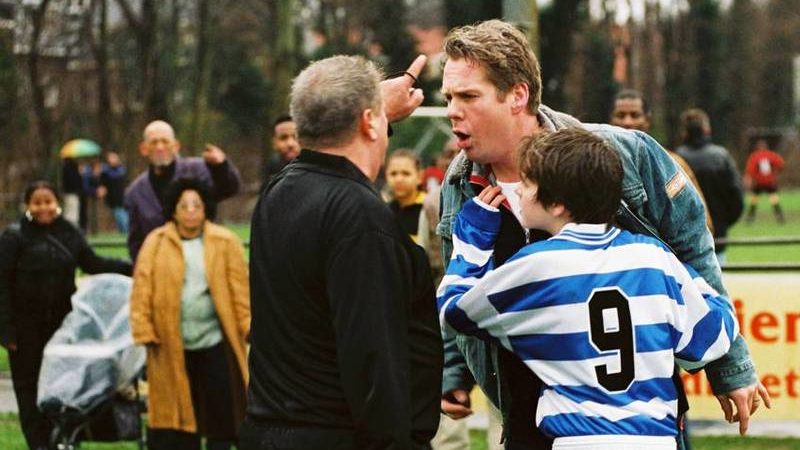

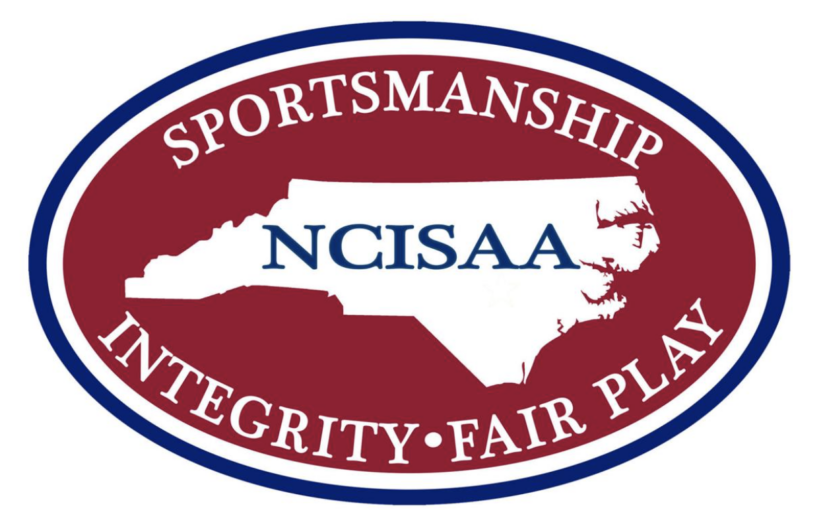


Coaches could also benefit from reading, “Coaching is Teaching at its Best!” This Book has helped coaches, athletic administrators, parents of young athletes and yes, even senior managers in the business world. A simple coaching philosophy and Ten Tips that help coaches become better leaders.
Love the website, and Great list – but consider removing Good To Great (add a Jerry Lynch Book). Both business schools and economists have deemed it a book of misplaced hindsight, where they picked out qualities of firms that were doing well but most failed the test of time and aren’t doing well any more. Many were just the beneficiaries of good markets, and the ends may not justify the means used during those periods. Thx again.
Chasing Perfect – Bob Hurley